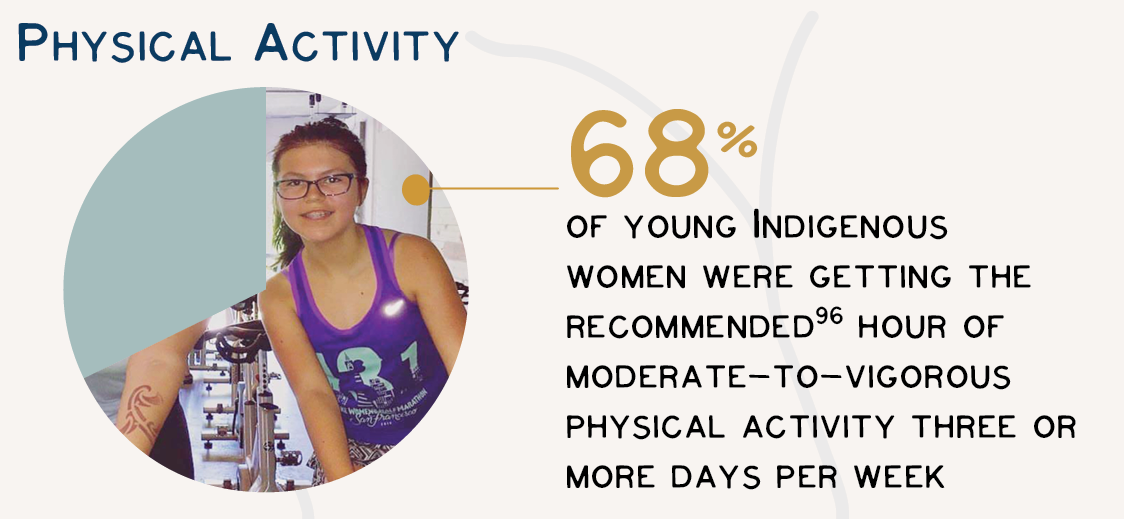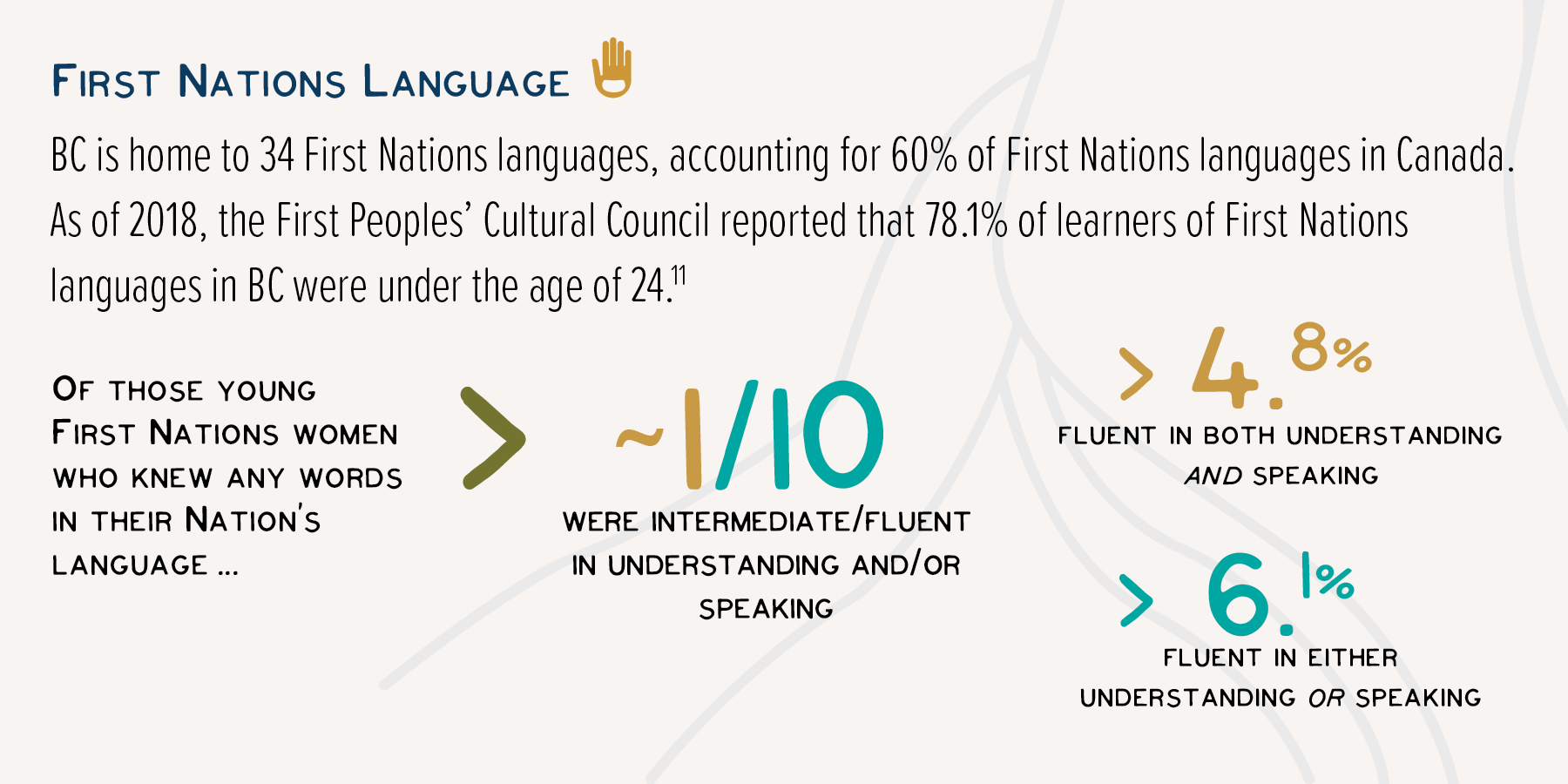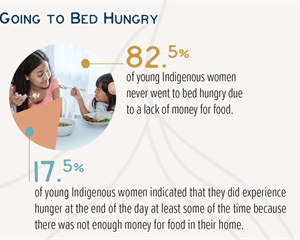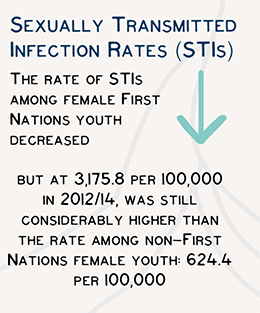Introduction
Youth hold a special place in First Nations families and communities. They represent the future and their health and well-being is understood as integral to the well-being and continuance of First Nations communities overall.

First Nations have long recognized adolescence as a critical period of development and growth, when girls transition into their roles as young women. As adolescents, they begin to establish their role within their families and communities and create their own path.
Rites of passage, such as coming-of-age ceremonies, are used to mark and celebrate this evolution. Through ceremony, young women receive blessings and teachings about their bodies and about their roles and responsibilities as adults.
Most of the data in this chapter is from youth between the ages of 10 and 19 who have self-identified as “female." However, the precise age range varies depending on the source of information. Download a pdf of this chapter.
“When I started my year-long 13-Moon Ceremony, I was 11 years old. It was December and when I finished it was January and I was 12 years old.
It was the middle of winter. We had to actually go down to the river after our sweat and get into the water and bathe in the water. We had to actually go and get an axe so that we could break off the ice so that we had a way to get into the water without slipping. It was me, my mother and my aunts that were there.
So there was probably about a good dozen of us women in the water at this point. And it was freezing cold, mind-numbingly cold, but the thing that makes it a really good memory is that it wasn't just me sitting there in the water, it was all of my aunts at the same time. So it made me feel a lot closer to these women in my community and my mother. It was all of us at once. And I didn't feel alone.
It was just something that we had to do and at that point, I had been through the training for a year so had developed a really deep sense of discipline and a sense of purpose in what we were doing."
– Alexa Manuel, Syilx and St'at'imc Nations
Roots of Wellness
Connections to culture and the ancestors, language and ceremony • Connections to land • Connections to community
The deepest roots of wellness for First Nations include self-determination, identity and connections to culture, the land and community. While important at every life stage, these connections can be especially significant in shaping young women's health during adolescence when so many aspects of their identity are in development.

Having strong connections helps girls to feel supported as they take on the responsibilities of being an adult and decide how best to apply their gifts.
“ƛaʔuukʷiʔatḥ (Tla-o-qui-aht) language reflects the ecology of our home – it comes from the land. And so in learning our language, I was able to learn so much more about our culture than I ever dreamed of … I learned not just our language, but I found pieces of my soul in different words that I learned."
– Gisele Maria Martin, Tla-o-qui-aht First Nation, past participant of the FPCC Mentor-Apprentice Program
Promising Practice
Culture is Healing is offered once a month by the youth program
Yúusnewas on the traditional and ancestral lands of the xʷməθkʷəy̓əm, Sḵwx̱wú7mesh and Tsleil-Waututh Nations.
The program was created and designed for life promotion through accessible and low-barrier cultural, spiritual and First Nations teachings, activities and knowledge.
Recognizing that urban Indigenous youth may experience a unique kind of displacement, the program's goal is to improve cultural revitalization for Indigenous youth living in large urban centres. Culture is Healing also serves and aims to provide a safer space for Indigenous youth to access peer support in the areas of sexual health and harm reduction.
Supportive Systems
The ongoing legacies of colonialism – racism and discrimination, violence and abuse, sexual harassment, and lateral violence and bullying • Systems – economic, food, housing, homelessness, health, youth justice and youth welfare
The wellness of young First Nations women is shaped above all by having self-determination, a strong sense of self, cultural identity and the ability to be in balance with the world around them. It is also shaped by the systems they must interact with to attempt to meet their basic needs: systems for education, health care, housing, transportation and justice.
 Western systems that are rooted in colonialism continue to oppress First Nations ways of being. As a result, young First Nations women continue to face racism, discrimination and marginalization when going about their daily lives, including accessing services and pursuing opportunities.
Western systems that are rooted in colonialism continue to oppress First Nations ways of being. As a result, young First Nations women continue to face racism, discrimination and marginalization when going about their daily lives, including accessing services and pursuing opportunities.
This exposure to racism is compounded by the impacts of sexism and other socially constructed biases. Young First Nations women face disproportionate levels of risk compared their non-Indigenous peers; risk in the form of abuse, exploitation, bullying and harassment.
First Nations youth are choosing to take action in diverse and creative ways, such as through the We Matter campaign, to promote approaches that are adapted to their lived realities and driven by youth needs and priorities.
"On a Sunday afternoon after a church service, I was given a Haida-designed necklace and told by the only other Indigenous women in the congregation that I was an Indian. I remember the sun shining in through the doors in Edmonton that day. I was raised by my mother (of German heritage), adopted by my father, and my culture was hidden from me until the age of 14, when I began to explore why I'd always felt different from the rest of my family.
Between the ages of 14 and 20 I experienced the break-up of my family and as a result I experienced homelessness and the child welfare system. During this time my long-standing issue with anorexia landed me in the hospital because my heart stopped beating due to my illness.
A healing journey began after I received care for my mental health. I learned that at the core of this disease I felt ashamed of who I was because I did not belong anywhere. After my recovery I went home to Haida Gwaii to live with my grandmother in my twenties. – Jaat Sdihltl'lxa (Heather Hatch), Haida from the Raven Clan
Promising Practice
N'we Jinan is a non-profit organization that travels to Indigenous communities and schools across North America. It is working to amplify the voices and stories of youth.
Empowering youth with knowledge in sound recording, music production, song writing, voice and performance, the program provides a platform for youth to share their experiences and relate to their broader community.
N'we Jinan has worked with youth in several First Nations in BC including youth in Kitsumkalum, who created and produced a song and music video about the Highway of Tears.
Healthy Bodies, Minds and Spirits
Being active • Healthy eating and body image • Sexual well-being • Reproductive justice • Mental health • Self-harm • Alcohol and substance use • Respecting tobacco
The vision of healthy, vibrant, self-determining young First Nations women involves well-nourished roots of wellness. It also requires the creation and maintenance of supportive systems that are free of systemic barriers.
 Having these elements in place will create the foundations necessary for all young First Nations women, their families and communities to flourish … and experience health outcomes, outcomes that are vital to development, happiness and fulfillment during youth and can shape the path of a woman's wellness in future phases of their life journey.
Having these elements in place will create the foundations necessary for all young First Nations women, their families and communities to flourish … and experience health outcomes, outcomes that are vital to development, happiness and fulfillment during youth and can shape the path of a woman's wellness in future phases of their life journey.
More than two-thirds of young Indigenous women (68 percent) reported getting the recommended hour of moderate-to-vigorous physical activity three or more days per week in 2013.
“I was really struggling with a really bad addiction with alcohol and I was using some other types of drugs. I went down to the fire pit and talked to an Elder and we're talking for a bit and she told me to keep on going in life. Just talking to an Elder will help you to go on the right pathway and sometimes life gets hard, but you keep on going and don't give up because everybody cares about you and you're a warrior, you should stay strong. Talk to an Elder, or a teacher, or somebody that really cares, 'cause I matter, you matter, we matter." – Mary Modeste, Coast Salish, Quwut'sun (Cowichan) Territory
Promising Practice
Ask Auntie is a free, interactive online platform that has been developed with input from Indigenous youth across BC.
The program replicates the traditional style of learning between an Auntie or Elder and a youth, providing a safe space in which to talk about and relay cultural teachings around puberty and sexual health, the body and relationship safety.
Communities adapt the program to the specific needs of their youth and incorporate the unique teachings of their own Nation.
